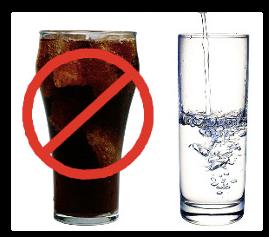Replacing your sugar-sweetened beverages with water may aid weight loss!

By Hisyam Mohsin, Graduate Student, Civil & Environmental Engineering Department, Virginia Tech
According to the National Health and Nutrition Examination Survey (NHANES), from 2007-2010, the average intakes of added sugars by either males or females in every age groups is higher than the recommended maximum limit of 10% of the total calorie intake. A major source of added sugars is calorically-sweetened beverages. This includes sweetened coffee and tea, soda, juice drinks, and many other beverages (Duffey et al, 2007; Kit et al, 2013).
In addition to containing calories, calorie-containing beverages are also not as filling as solid foods (Flood-Obagy, 2008). This means, a person who drinks soda or juice may consume higher total calories from both food and beverages, to feel full or satisfied.
Related to this idea, a study on drinking water for weight loss by the Virginia Tech Department of Human Nutrition, Foods and Exercise was conducted. With just 2 cups of water prior to 3 daily meals for 12 weeks, a group that consumed water lost 5 lbs. more weight than a group that did not drink water (Dennis et al, Obesity, 2010). A similar results was found when water fountains and short educational lessons on the importance of drinking water were introduced to students in 32 elementary schools in low-socioeconomic status (SES) areas for a year. Water consumption was increased and the risk of overweight was reduced (Muckelbauer et al, Obesity, 2010).
The article was written based on a presentation by Dr. Brenda M. Davy in the Virginia Tech Department of Human Nutrition, Foods and Exercise titled: ‘I’ll Drink to That! Beverages and Adult Weight Management’ on Jan 24, 2020 for GRAD 5414 Water for Health: Interdisciplinary Seminar course.


